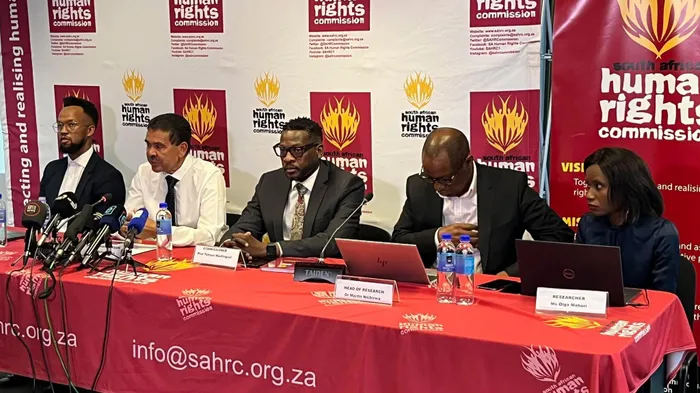Fact Check: Examining the role of foreign nationals in South Africa's Human Rights Commission

The South African Human Rights Commission foreign staff controversy: A closer look at human rights and nationality
Image: Facebook / SAHRC
The ongoing debate over the presence of foreign nationals in South African state institutions has sparked passionate discussions nationwide after allegations surfaced that the head of research at the South African Human Rights Commission (SAHRC) is a Ugandan national.
Operation Dudula, a group known for its anti-immigration stance, swiftly voiced disapproval. Prominent figures such as African Transformation Movement (ATM) leader Vuyo Zungula joined the criticism.
On social media platform X, many South Africans expressed frustration, linking the alleged nationality of the SAHRC senior staff member to accusations that the Commission is biased in favour of foreign nationals in its rulings.
This reaction comes as South Africa faces the highest unemployment rate globally, intensifying competition for limited job opportunities.
Political analyst Sandile Swana defended the SAHRC, emphasising the universal nature of human rights. “Human rights is an international subject under the United Nations and is taught in virtually all law schools,” Swana explained.
“Your ethnic background is not more important than mastering law and its application. That law covers immigration and refugees, among other issues.”
Swana highlighted the ethical responsibilities tied to professions serving the public good.
“Health services are governed not just by budgets but also by oaths of office and ethical pledges to provide care without discrimination at all times - even in war, even to enemy soldiers and prisoners.”
Further stressing the inalienable nature of human rights, Swana said, “Human rights are generally inalienable, which means they are built into the human being and should not be extracted or set aside.”
Calling for reassessment of biases, he urged the public to judge all SAHRC employees on their legal expertise and impartiality rather than ethnicity or nationality.
“It would not help to appoint a Xhosa or Khoisan to such a position if they lack legal knowledge or consistently favour natives while jeopardising refugees and immigrants,” he stated.
To put South Africa’s situation in a global context, Swana cited immigration statistics from other countries. In England and Wales, 16.8% of residents were born outside the UK as of 2021 - roughly 10 million people - with 63.6% originating outside the European Union.
According to Statistics South Africa, immigrants comprised approximately 3.9% of South Africa’s population as of 2022, up from 2.1% in 1996.
Swana noted that some studies indicate fluctuations, ranging between 2.9 million people and up to 7.2% at peak times.
“South Africa does not have an extraordinary percentage of immigrants,” he said.
Swana also reminded critics that “the president of Botswana is Xhosa,” highlighting the region's fluidity and complexity of national identities.
“Many white South Africans are immigrants, tracing their origins to Europe and West Asia,” he added.
Amid mounting concerns, SAHRC spokesperson Wisani Baloyi issued a formal statement earlier this week to address what he described as misinformation surrounding the Commission’s staff composition and mandate.
Baloyi confirmed that although the SAHRC employs foreign nationals, claims that most staff or managers are non-nationals are false.
“The Commission employs 169 staff members, of whom only seven are non-nationals. Among 16 senior managers, only one is a non-national,” he clarified.
He reiterated the Commission’s constitutional mandate to promote, protect, and monitor human rights “independently and impartially, without fear, favour, or prejudice,” regardless of an individual’s nationality.
“The Commission rejects this narrative in totality,” Baloyi said, responding to allegations that the SAHRC serves only non-nationals.
Baloyi also provided recent performance figures, noting that in the 2024-25 financial year, the SAHRC finalised 7,516 complaints, the majority of which were submitted by South African citizens.
The Commission also released four major reports detailing the state of human rights, government implementation of recommendations, regional and international human rights developments, and its constitutional duties under Section 184(3) of the Constitution - work he said had been unfairly overshadowed by misinformation campaigns.
Addressing employment policies, Baloyi said all SAHRC employees are “employed in accordance with enabling legislation, the Labour Relations Act, and other relevant policies and regulations.”
He called for public debate to shift from nationality-based suspicion to a focus on “competence, fairness, and adherence to South Africa’s constitutionally enshrined human rights.”
thabo.makwakwa@inl.co.za
IOL Politics
Get your news on the go. Download the latest IOL App for Android and IOS now
Related Topics: